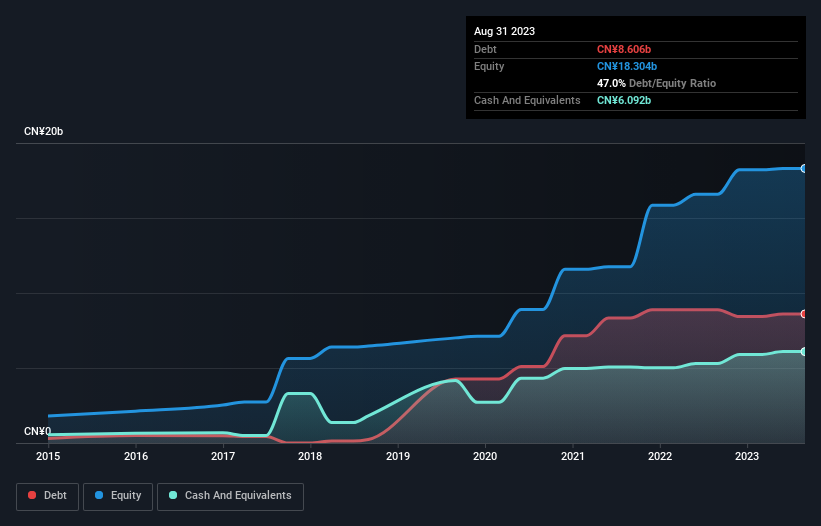- Hong Kong
- /
- Consumer Services
- /
- SEHK:839
China Education Group Holdings (HKG:839) Takes On Some Risk With Its Use Of Debt

Warren Buffett famously said, 'Volatility is far from synonymous with risk.' It's only natural to consider a company's balance sheet when you examine how risky it is, since debt is often involved when a business collapses. As with many other companies China Education Group Holdings Limited (HKG:839) makes use of debt. But the real question is whether this debt is making the company risky.
When Is Debt A Problem?
Debt assists a business until the business has trouble paying it off, either with new capital or with free cash flow. Part and parcel of capitalism is the process of 'creative destruction' where failed businesses are mercilessly liquidated by their bankers. While that is not too common, we often do see indebted companies permanently diluting shareholders because lenders force them to raise capital at a distressed price. By replacing dilution, though, debt can be an extremely good tool for businesses that need capital to invest in growth at high rates of return. The first thing to do when considering how much debt a business uses is to look at its cash and debt together.
View our latest analysis for China Education Group Holdings
What Is China Education Group Holdings's Debt?
The chart below, which you can click on for greater detail, shows that China Education Group Holdings had CN¥8.61b in debt in August 2023; about the same as the year before. However, it does have CN¥6.09b in cash offsetting this, leading to net debt of about CN¥2.51b.

A Look At China Education Group Holdings' Liabilities
The latest balance sheet data shows that China Education Group Holdings had liabilities of CN¥8.23b due within a year, and liabilities of CN¥9.22b falling due after that. Offsetting these obligations, it had cash of CN¥6.09b as well as receivables valued at CN¥307.0m due within 12 months. So it has liabilities totalling CN¥11.1b more than its cash and near-term receivables, combined.
When you consider that this deficiency exceeds the company's CN¥10.9b market capitalization, you might well be inclined to review the balance sheet intently. In the scenario where the company had to clean up its balance sheet quickly, it seems likely shareholders would suffer extensive dilution.
We measure a company's debt load relative to its earnings power by looking at its net debt divided by its earnings before interest, tax, depreciation, and amortization (EBITDA) and by calculating how easily its earnings before interest and tax (EBIT) cover its interest expense (interest cover). The advantage of this approach is that we take into account both the absolute quantum of debt (with net debt to EBITDA) and the actual interest expenses associated with that debt (with its interest cover ratio).
Looking at its net debt to EBITDA of 0.87 and interest cover of 5.6 times, it seems to us that China Education Group Holdings is probably using debt in a pretty reasonable way. So we'd recommend keeping a close eye on the impact financing costs are having on the business. One way China Education Group Holdings could vanquish its debt would be if it stops borrowing more but continues to grow EBIT at around 19%, as it did over the last year. When analysing debt levels, the balance sheet is the obvious place to start. But it is future earnings, more than anything, that will determine China Education Group Holdings's ability to maintain a healthy balance sheet going forward. So if you want to see what the professionals think, you might find this free report on analyst profit forecasts to be interesting.
Finally, a company can only pay off debt with cold hard cash, not accounting profits. So it's worth checking how much of that EBIT is backed by free cash flow. In the last three years, China Education Group Holdings's free cash flow amounted to 23% of its EBIT, less than we'd expect. That's not great, when it comes to paying down debt.
Our View
Even if we have reservations about how easily China Education Group Holdings is capable of staying on top of its total liabilities, its EBIT growth rate and net debt to EBITDA make us think feel relatively unconcerned. We think that China Education Group Holdings's debt does make it a bit risky, after considering the aforementioned data points together. Not all risk is bad, as it can boost share price returns if it pays off, but this debt risk is worth keeping in mind. The balance sheet is clearly the area to focus on when you are analysing debt. But ultimately, every company can contain risks that exist outside of the balance sheet. Case in point: We've spotted 4 warning signs for China Education Group Holdings you should be aware of.
If you're interested in investing in businesses that can grow profits without the burden of debt, then check out this free list of growing businesses that have net cash on the balance sheet.
New: AI Stock Screener & Alerts
Our new AI Stock Screener scans the market every day to uncover opportunities.
• Dividend Powerhouses (3%+ Yield)
• Undervalued Small Caps with Insider Buying
• High growth Tech and AI Companies
Or build your own from over 50 metrics.
Have feedback on this article? Concerned about the content? Get in touch with us directly. Alternatively, email editorial-team (at) simplywallst.com.
This article by Simply Wall St is general in nature. We provide commentary based on historical data and analyst forecasts only using an unbiased methodology and our articles are not intended to be financial advice. It does not constitute a recommendation to buy or sell any stock, and does not take account of your objectives, or your financial situation. We aim to bring you long-term focused analysis driven by fundamental data. Note that our analysis may not factor in the latest price-sensitive company announcements or qualitative material. Simply Wall St has no position in any stocks mentioned.
About SEHK:839
China Education Group Holdings
An investment holding company, engages in the operation of private higher and secondary vocational education institutions in Mainland China and Australia.
Adequate balance sheet with moderate growth potential.
Market Insights
Community Narratives




